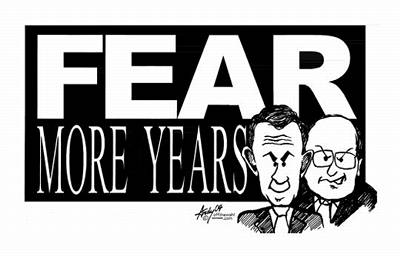|
||||
|
|
|
|||
| Home | Subscribe | Back Issues | The Organization | Volunteer | ||||
|
||||
Home of the Timidby Doug CollinsA lot of us have traditionally considered America to be the "home of the brave," a place where people take selfless risks on behalf of their beliefs. But how brave are we? Soldiers are typically thought to exemplify bravery. But look at American military strategy in Iraq: carpet bombing from planes tens of thousands of feet up, followed by "overwhelming force" from armored vehicles. Are we being very brave while we bomb people to bits with our high-tech remote-control night-vision equipment? Not to mention the recent use of napalm and other chemical weapons--employed by Americans--in Fallujah (see the Norman Solomon article this issue). Certainly it takes bravery for any soldier to run into battle--as many American soldiers have recently--but for American occupation ground soldiers, the risks are comparatively much smaller than for Iraqi independence fighters, who have no armor, no bullet-proof vests, and outdated arms. The death rate of Iraqi "insurgents" has been roughly 20 times that of American soldiers. Certainly one could make a case that an Iraqi who takes up the cause of Iraqi independence--with no soldier's salary and at great personal risk--is much braver indeed. Actually, the result of the Iraq war is that lack of bravery has multiplied in the US. As a result of all the mess in the Mideast, many more Americans are now probably scared of traveling internationally because so many more people around the world now hate us. And domestically, I'd bet that any given American is either afraid of Islamic immigrants or afraid of Patriot Act abuses--and perhaps afraid of both! 
American timidity has been with us for some decades now, and I think it is growing. You can see it in the continuing decline of unions in the US, in the actions of self-concerned labor leaders who use dues money to consolidate their labor fiefdoms rather than to organize the rank-and-file. You can also see it in the reluctance of American workers to support each other when there are abuses by management, workers who instead engage in petty competition for meager individual promotions. You can see timidity in the boardrooms of corporations, where managers protect themselves from public liability with a thick armor of legal documents. You can see it in SUVs that so many of us drive, which are almost like armored vehicles themselves (after all, in an accident it's better to crush than to be crushed). You can see it in the mainstream commercial news, which prefers "lite" topics--the emphasis is on cute animal stories and exciting video clips--rather than reporting on the toxic pollution that is accumulating in all of our bodies. Modern Americans are not generally brave. In fact, we're generally craven, and easily manipulated. Our last Presidential election is a prime example. In spite of dozens of indicators of foul play regarding the recording of ballots (see articles on election fraud this issue), Presidential candidate John Kerry rolled over and died right after the network news election reports, and the mainstream media has followed suit in its blackout of news reporting on the election fraud. In Ukraine, however, election fraud resulted in huge public protests and a new vote which brought the opposition into office. Ukrainians, it seems, are much braver than Americans. Rather than being a brave lot, we Americans tend to be quite timidly alone at home, glued to our TV screens, watching CNN or Fox news--if we watch news at all. It occurs to me that America is suffering from a large degree of two-dimensionality. We as a nation are dependent on flat TV screens--rather than three-dimensional reality--for most of our information. Next time I find myself glued to the TV, I plan to ask myself: is the truth ever going to burst forth out of the video screen during the network news broadcast and confront me in my living room? Am I simply--out of fear--avoiding reality when I'm home watching TV on the couch? |
|
